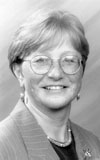IOP seminar to address eating disorders
by Chris WestPublic Relations
Since there are no easy solutions to combating eating disorders, information dissemination and raising awareness remain powerful tools.
 Dr.
Carolyn Cochrane
Dr.
Carolyn Cochrane
For Carolyn Cochrane, Ph.D., R.N., the credo: “information is power” is critical where the topic of eating disorders is concerned. This attitude and drive has brought her to host the first of the 2002 Mind Your Health Seminar series as moderator of “Eating Disorders 101: A crash course on ways to prevent and treat disordered eating.”
The popular community education series based in MUSC’s Institute of Psychiatry has returned in 2002 with a different format, adding a moderator to each seminar who will provide an overview of the topic, an interactive discussion with a panel of experts from the local community followed by a question-and-answer segment.
“Since Feb. 10-16 is Eating Disorders Awareness Week, it was decided that this would be the most appropriate time to kick off the series,” Cochrane said. “It’s important because the seminar will give participants information they can take home with them and utilize.”
The information will center around anorexia, bulimia and binge eating
disorder (BED), their symptoms and effects of each on the body, prevention
methods and treatment options.
“The seminar should serve as a great platform to generate awareness
and shed some light on the subject,” she said. “It is hard to wade through
some of the misconceptions of eating disorders and often they are underdiagnosed.”
What Cochrane is referring to may lie in the numbers. According to The National Women’s Study conducted on more than 3,000 women, 0.1 to 0.8 percent have anorexia, 2 to 3 percent have bulimia and another 1 percent have BED.
“While these numbers seem strikingly low, it doesn’t account for symptoms of the disease without the full-blown illness nor unreported or misdiagnosed cases,” Cochrane said. “They don’t reflect those on a subclinical level.” The women’s study cited that 24 percent of the women studied admitted having disordered eating symptoms, yet were not diagnosed with the illness itself.
So who is really getting hit by these disorders? According to Cochrane, young women. “Girls are especially at risk when other precipitating and/or perpetuating factors increase their comorbidity, such as abuse, obsessive/compulsive disorder and other social factors such as poor body image, low self esteem or the pressure to succeed.” But in truth, disordered eating habits leave no sex or age group immune.
Due to the nature of these disorders the treatment model must be tailored to the individual patient. But aside from the current standard of care, Cochrane admits there are no secret weapons to fight these potentially lethal disorders. “Food is the most important medicine now,” she said. “But current and future research is where hope lies.”
And Cochrane should know. She is currently conducting a study that treats women with both an eating disorder and a substance abuse problem. This MUSC study, funded by a grant from the National Institutes of Health, treats 18-year-old-plus women who have been diagnosed with a binge eating type disorder and who use a stimulant to aid in weight loss. The study duration runs 11 weeks and is free to qualified participants.
The seminar will take place from 6 to 8 p.m. Feb. 12 in the Institute of Psychiatry Auditorium. A $5 registration fee is required and includes parking, refreshments, a certificate of attendance and workshop materials. Participants are also able to submit questions prior to the seminar for the panel to specifically address and advanced registration is required.
For more information regarding the seminar or to register online visit
its Web site at http://www.musc.edu/psychiatry/events.htm
or call 792-7340 to have a registration brochure mailed.